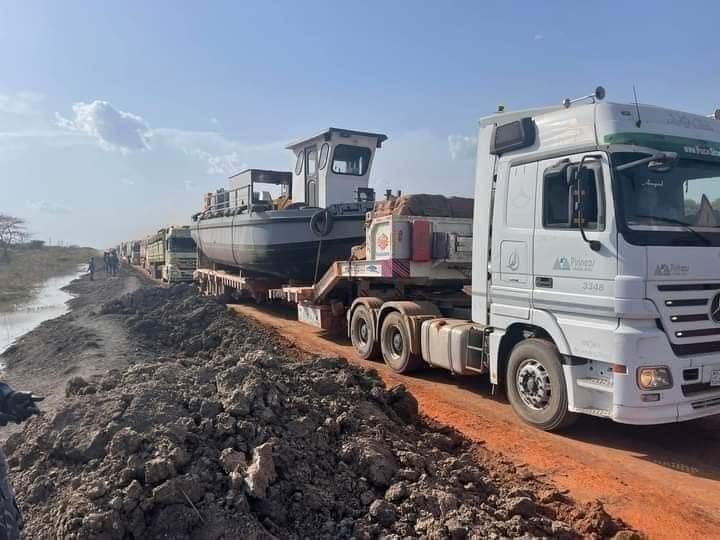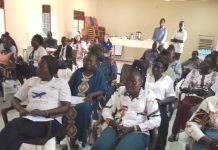Africa-Press – South-Sudan. The dredging of the Naam River to stave off recurrent floods has once again put environmentalists and proponents of such initiatives on a collision path.
Water Resources and Irrigation Ministry had proposed a project to dredge rivers and resume digging of the Jonglei Canal. But this development has no doubt elicited mixed reactions from various stakeholders.
The project was meant to limit the impact of floods on citizens living along Sudd Wetlands, boost agriculture and limit the chances of insecurity in areas such as Jonglei State and the Greater Pibor Administrative Area, according to the proposal document presented by Minister Manawa to the government for approval and funding last year.
Although sounding nice to the ear, the resultant backlash has triggered apathy from stakeholders, with ministries declaring their stands, some disowning it.
Apart from the International Organization for Immigration (IOM) dispelling the allegations that it was funding the dredging of the Naam River, the Ministry of Foreign Affairs and International Cooperation, also followed suit, distancing itself from the project, saying they dealt with diplomatic issues and did not discuss funding of the project with IOM during the two separate meetings they held.
“The Ministry of Foreign Affairs and International Cooperation is not the line ministry delegated with the file of water resources within South Sudan. The concerned Ministry, the Ministry of Water Resources and Irrigation works in Conjunction with the office of the President, Parliament and cabinet before any decisions regarding our water resources are made,” the statement from the Ministry read.
Prof John Akec, the vice-chancellor of Juba University said: ‘‘In a normal situation and such a meeting, a Ministry of Foreign Affairs would be interested to know how a foreign driven project such as dredging of Naam River is going to impact our national interest and national water security. No?’’
Ironically, Eye Radio reported on Tuesday that the Press Secretary in the Office of President, Ateny Wek Ateny denied the government did not approve the project.
This was despite Peter Bakuony, the press secretary in the office of the governor of Unity State, Dr Joseph Nguen Manytuil, saying clearly that the equipment was procured from Egypt by the Ministry of Water Resources and Irrigation in collaboration with the government of Egypt.
He stressed that the equipment was not necessarily for Jonglei Canal but to dredge the Naam River to drain flood water into it so that refugees could return to their homes.
Project disowned
Yesterday, the Minister for Environment and Forestry, Josephine Napwon, disowned the project saying it must not commence until proper assessment had been made of the dire consequences and possible benefits of such a project.
She noted that the project was designed to address the impacts of floods which had displaced over 800,000 people. The minister added that her ministry was yet to be notified about the project, adding that it required extensive research before its commencement.
“The Ministry of Water Resources and Irrigation is the proponent of these projects and we are yet to be notified officially by the Ministry of Water Resources and Irrigation requesting for the conduct of a comprehensive Environmental and Social Impact Assessments (ESIA), and Hydrological studies,” Napwon said.
Napwon noted that dredging was still illegal until the ministry is notified and the ESIA is carried out.
“Therefore, since the above process has not commenced, any dredging of rivers is illegal. No project with such a magnitude without the clearance of the Ministry is to be implemented,” she added.
“On resumption of Jonglei Canal to drain Sudd Wetland to mitigate floods, the Ministry of Environment and Forestry will not approve the resumption or completion of the canal because of the ecosystem services that Sudd provides to our nation, the region and the world.”
Prof Jok Madut Jok, the executive director of the Sudd Institute, stated that there were environmental hazards related to the dredging and digging of the Jonglei Canal, calling it the resumption of colonialism.
“Jonglei Canal cannot be resumed if we South Sudanese don’t see the value of doing so. If the government of South Sudan insist on doing so in exchange for a few goodies from Egypt, we will all die before that happens,” he said.
He added that they protested the digging of the canal in the 1980s while they were students and it led to the loss of lives of some students among them.
“Whether or not the canal project resumes, the glaring reality is that people in the Sudd region and across South Sudan constantly suffer the destruction of livelihoods and hunger still defines the lives of many of them. The majority of learned South Sudanese know the livelihoods, climate and environmental consequences of a canal, which is why even us at a tender age protested all across the country in the early1980s,” said Jok
But for Bol Mayen Aru, a Twitter user, digging of Canal could help in reducing floods and boosting agriculture.
“I disagree totally with those petitions against the digging of the Jonglei canal because this can help during flooding season later. I think that could be the only alternative to reduce destructive flooding in Jonglei,” Bol said.
This was a contradiction of sentiments by Gai Cikom Ayieidit, who said, “No water no life. Let’s stop resumption, and sometimes bilateral relations between our government and Egypt.”
Citizens argue that the presence of floods displaces people but comes with sources of livelihood, and equate the digging of the Jonglei Canal and dredging of rivers to famine, which might spare citizens in a country where resources are currently scarce.
But the biggest deal remains as to what are the positive or negative impacts of the project on the environment and the people or whether it means selling of Nile Waters to Egypt with malice aforethought.
Yesterday, the Press Secretary in the Ministry of Water Resources and Irrigation, Gattiek Gatkuoth Wichar, wrote a statement saying dredging was meant to remove weeds in rivers so that they could be navigable, for carriage of goods and petroleum products.
Government approves budget
In mid-May, Eye Radio reported that over $28.3 million had been approved by the Council of Ministers geared towards the purchase of water resources management equipment.
The Minister for Information, Communication Technology and Postal Services were quoted as saying the budget was meant to fund the cleaning of some rivers and construction of water reservoirs to alleviate flooding across the country.
“The operationalisation of this project according to him is for the purchase of equipment that is needed for the ministry in order to enable it to conduct its duties and to acquire items of development of water sources,” Makuei said.
For More News And Analysis About South-Sudan Follow Africa-Press






